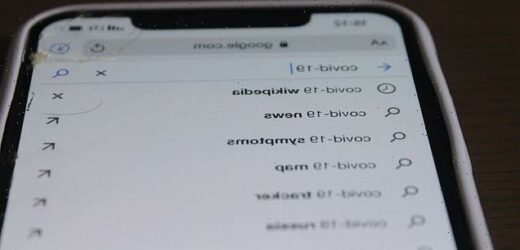Google is giving Britons incorrect advice through its Covid-19 ‘common questions’ feature, advising users that they can stop self-isolating when NHS rules say the opposite, report warns
- Google shows incorrect answers to queries on self isolation, investigation says
- Users have been told they don’t have to self-isolate when the NHS says they do
- Google is reportedly fixing the problem after a request from the UK government
Google is giving Brits incorrect Covid-19 advice about whether or not they have to isolate, an investigation reveals.
The search engine has been telling UK users they can stop isolating under certain circumstances, going against the NHS’s guidance, according to the Guardian.
Following a request from the UK government, Google is reportedly fixing the issue – which relates to contact tracing and isolating after a negative Covid test.
The potentially dangerous error features under Google’s ‘common questions’ tool, which tries to present simple answers to user questions, often clumsily scraped from other websites.
‘Common questions’ is one of Google’s attempts to keep users on the search engine, rather than clicking away to other websites, the investigation claims.
Google is showing the incorrect answers to particular questions regarding self isolation, according to the new investigation
WHAT IS CONTACT TRACING?
Contact tracing is the process of identifying people who have been exposed to a disease to prevent onward transmission.
The UK has a contact tracing app – NHS Test and Trace.
The app, a decentralised tool relying on Google and Apple Bluetooth technology, was introduced in September 2020 following months of delay and questions about its effectiveness.
The app for iOS and Android asks users to log whether or not they symptoms and uses Bluetooth to keep track of other phones it has come into contact with.
‘Common questions and answers in Google search are generated by Google,’ a government spokesperson told the Guardian.
‘The Government Digital Service (GDS) works to ensure that all gov.uk information is clear and can be accessed directly from search engines, such as Google.
‘Gov.uk plays a critical role in helping people and businesses get the latest information and support in response to the pandemic.
‘Covid-19 content and services are regularly kept up to date to ensure that they reflect the latest government policy.’
According to the investigation, Google gives the wrong results when someone searches, ‘Do I need to self-isolate after contact tracing if I test negative’.
This particular search brings up a list of questions under its list of ‘common questions’, one of which is ‘Can I stop self-isolating if I test negative for Covid-19?’
This question features the wrong answer – ‘If your test is negative, you will no longer be required to self-isolate’ – that’s been taken from a slightly different question on the gov.uk website.
In reality, even if your test is negative, you have to isolate for 10 days from your date of exposure after receiving a notification from the NHS that you may have been exposed to Covid.
In a statement to MailOnline, a Google spokesperson said many answers – or ‘snippets’ – taken from authoritative sources like the NHS are selected by algorithms.
‘However, these snippets can still be missing important context, or only be relevant to part of the user’s question,’ the spokesperson said.
‘We regularly review all of the question/snippet pairs we show in this feature to ensure that they are not outdated or missing any critical context.
‘We have reviewed this snippet against our policies and taken appropriate action.’
Google would not say how long the incorrect information had been displayed or how many users had seen it.
A disclaimer beneath the common questions says: ‘For informational purposes only. Consult your local medical authority for health advice.’
This suggests that users would be best off visiting the official government website and the NHS to get the correct information.
Google blocked more than 99 million Covid-related ads in 2020, including those for ‘miracle cures’ and fake vaccine doses, the firm said in March 2021
The tech giant has claimed to have kept on top of misinformation during the pandemic – in March, it said it removed more than 99 million malicious ads for fake Covid-19 cures and fake vaccine doses last year.
Google has also previously teamed up with the WHO to launch an SOS Alert dedicated to the coronavirus.
The search engine prioritises information on the virus from the WHO, including safety tips and WHO Twitter updates on the spread of the virus and how to stay safe.
However, early in the pandemic, YouTube, which is owned by Google, was accused of making money from videos promoting quack cures for coronavirus including herbs, meditative music and over-the-counter supplements.
Non-profit research initiative the Tech Transparency Project (TTP) said YouTube has run ads on videos that promote sham remedies like herbs and smoothies for the deadly illness.
GOOGLE HOSTED ADS CHARGING MORE THAN FIVEFOLD THE ORIGINAL PRICE FOR GOVERNMENT SERVICES, INVESTIGATION FOUND
Google hosted adverts for unofficial services like applying for a visa that charge vastly inflated amounts, a BBC investigation revealed in May.
The search engine returned ads for services charging £50 to change an address on a driving licence – something that can be done for free on the government’s website.
Applying for an ESTA travel permit on the US government’s website should cost no more than £10 ($14).
But Google ‘repeatedly’ allowed ads for websites charging more than £58 ($80) for an ESTA, the BBC found.
Some of the companies charge more than five times the amount charged by the official websites.
Adverts for unofficial services selling government documents are against Google’s own rules.
Read more: Google ‘is hosting ads that charge for free services’
Source: Read Full Article




